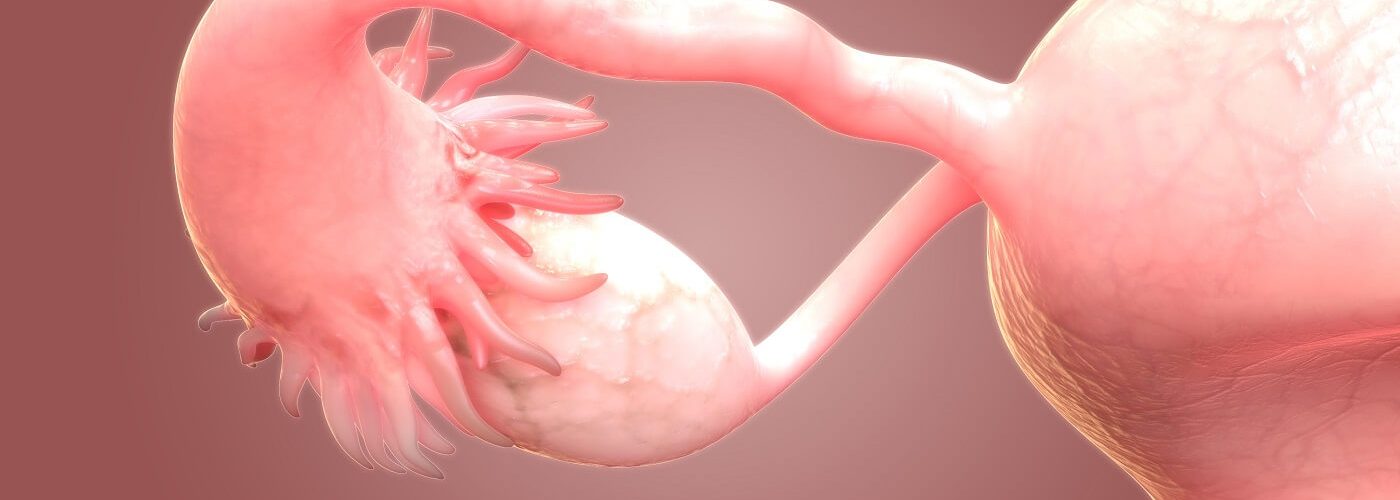
When discussing female reproductive health, the ovary size plays a crucial role. It’s not only important that they function correctly and ovulate regularly, but their dimensions are also critical in the chances of achieving a pregnancy.
In this blog, we will explain the desirable size of the ovaries, how they evolve throughout a woman’s life, and why they determine her fertility. We will also provide guidance on enhancing oocyte quality through lifestyle choices.
How big is an ovary in mm?
Ovarian size influences ovarian reserve, which refers to the number of eggs ready for fertilization that they house. Therefore, as we will see later, ovarian size is important for achieving pregnancy.
The normal size of an ovary during adulthood is 3.5 x 2 x 1 cm, equivalent to a volume of 3-6 ml. In a healthy ovary with these dimensions, the oocyte reserve is likely to be sufficient. However, the physiological shape can change in each ovarian cycle due to the growth of the dominant follicle. This can reach a size of 22-24 mm in the middle of the menstrual cycle.
Hence, an abnormal ovarian size does play a role at the moment of fertilization. The proportions need to be appropriate. Additionally, the size of the oocyte is also important at the time of fertilization, as it must have proper dimensions. The minimum size required for an oocyte to result in a pregnancy is 18-20 mm.
The evolution of the ovary throughout time
Ovaries begin to develop in the embryo around the 8th week of gestation. Throughout pregnancy, they undergo evolutionary changes that prepare them for their function when a woman reaches her fertile age. These are the stages that the ovaries go through, along with the measurements at each stage:
- Childhood: A newborn girl typically possesses two ovaries. Each one measures 1 cm in diameter and weighs approximately 250-350 mg. These structures contain all the cells that will be ovulated later in the successive menstrual cycles. This means that the egg that matures, ovulates, and travels to the fallopian tubes later on each month is the same age as the woman herself. It’s important to remember that a finite number of eggs is present at birth, and they do not regenerate.
- Puberty: As a result of complex hormonal changes, the first ovulation occurs. The ovaries will have gradually increased in size during childhood, and their weight will have multiplied by ten.
- Adulthood: During this stage, the ovaries reach an average size of 3.5 x 2 x 1 cm.
- Menopause and the ovary’s size. With the passage of years, the number of eggs decreases in the ovaries. Eventually, ovulation ceases, and menopause begins. During this phase and afterward, the ovaries decrease in size.
Ovary size and fertility
As we’ve seen, the size of the ovaries is linked to the quantity of potential oocytes available during a woman’s fertile period. If a woman has small ovaries, this likely indicates a diminished ovarian reserve. Therefore, the reduced size of the ovaries influences the ability to conceive. The number of eggs ready for fertilization will depend on the size of the ovaries.
This leads to the following question: Does having large ovaries increase your chances of pregnancy?
No, a woman with larger ovaries isn’t necessarily more fertile. The larger size of the ovaries could be due to the presence of cysts or tumors. Such cases are often associated with tumoral pathologies or ovulation disorders. These situations can lead to varying degrees of difficulty in achieving pregnancy.
On the other hand, in a woman’s normal life, the size of the ovaries can change for various reasons. Age, pregnancy, ovarian disorders, and hormonal stimulation are some of these factors.
How is Ovarian Size Evaluated?
To assess ovarian size and function, ultrasound scans are used. They are quick and easy to perform, providing information not only about ovarian size but also about the count of antral follicles. The latter might be even more important, as the quantity of these structures is linked to ovarian reserve.
Another diagnostic test is blood analysis, which helps determine hormone levels related to ovarian function. For instance, anti-Müllerian hormone (AMH) is a reliable marker of ovarian reserve. Women are advised to undergo AMH testing from an early age to gain valuable insights into their fertility potential.
Lifestyle Changes to Improve Ovary Health
It is indeed possible to improve ovarian quality and size, but this requires the supervision of a specialist. Certain habits can contribute to maintaining good ovarian and oocyte health.
Physical Exercise
Engaging in regular physical exercise is beneficial for overall health as well as for the health of ovaries and oocytes.
Weight Management
Both excessively low and overweight body weight can affect oocyte quality. It’s advisable to maintain a healthy weight in line with one’s physical characteristics.
Healthy and Balanced Diet
Maintaining a healthy weight doesn’t solely depend on diet; it should include an appropriate amount of essential nutrients such as carbohydrates, proteins, fiber, fats, minerals, and vitamins.
Stress Management
Stress can impact ovarian health. Women seeking pregnancy should adopt strategies to manage the stress associated with infertility. Striving for emotional balance through relaxing or enjoyable activities is important.
Ovary Size and Hormonal Imbalances
At IVI, we can conduct the necessary tests to evaluate your ovarian function. Our specialists can also assist in addressing hormonal imbalances that might be linked to the size of your ovaries.
Remember that if you’ve been having unprotected intercourse for over a year without conceiving, it’s advisable for a specialist to conduct a fertility assessment. This will involve tests and ultrasound scans to consider all factors. For more information, feel free to call us or leave your details in our online form, and our team will get in touch with you.






Comments are closed here.